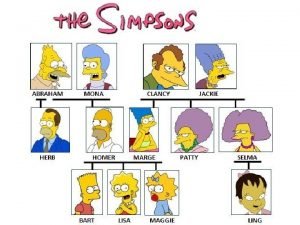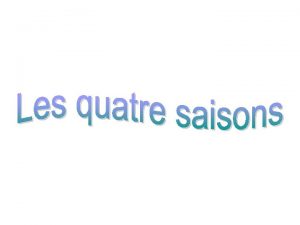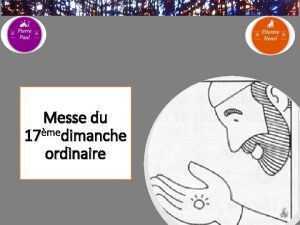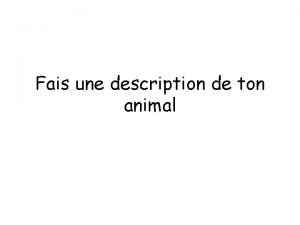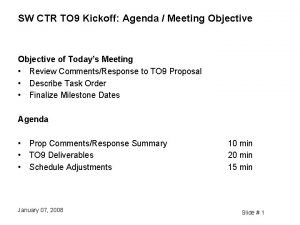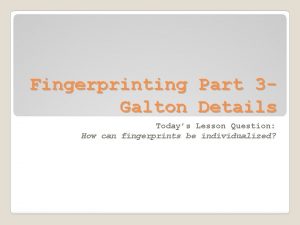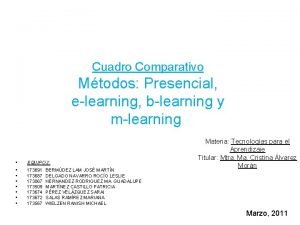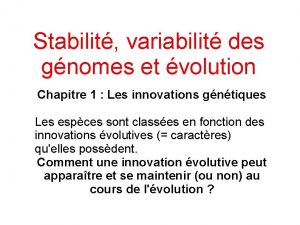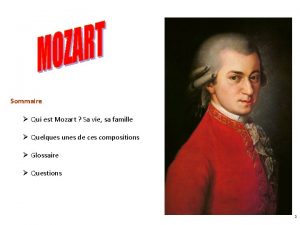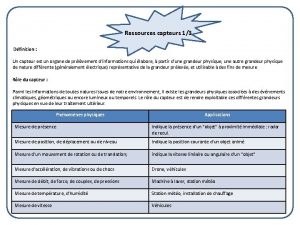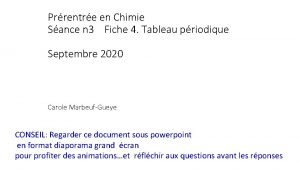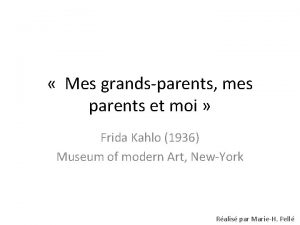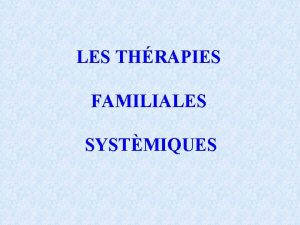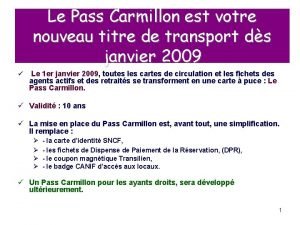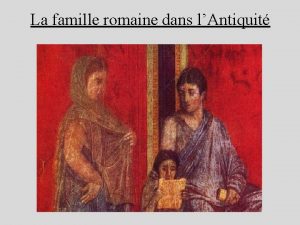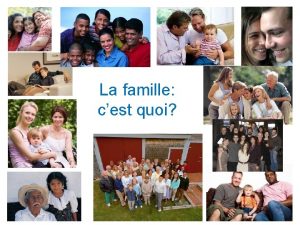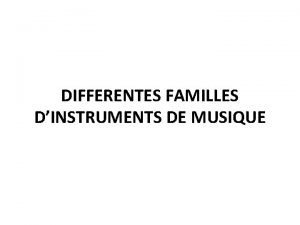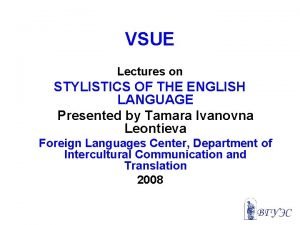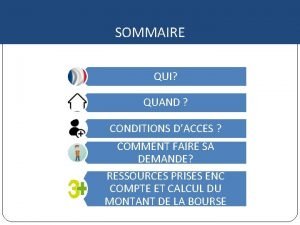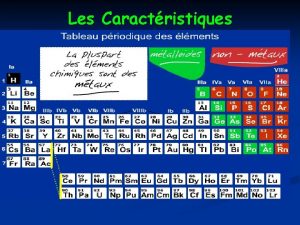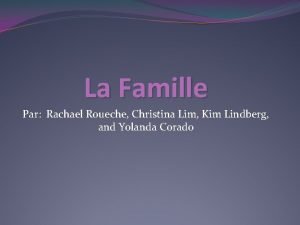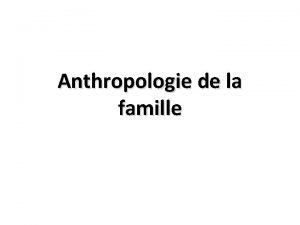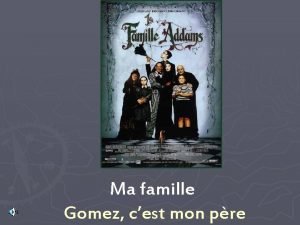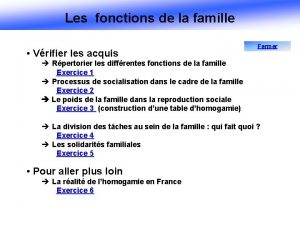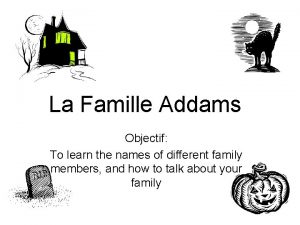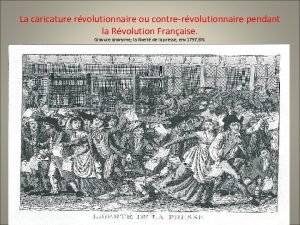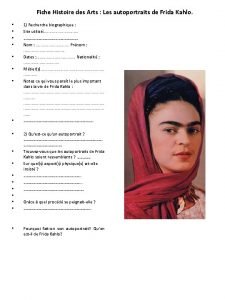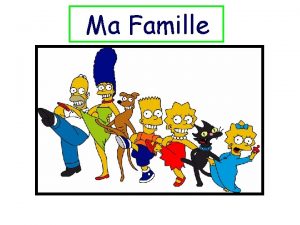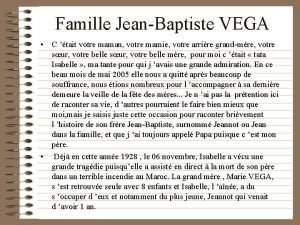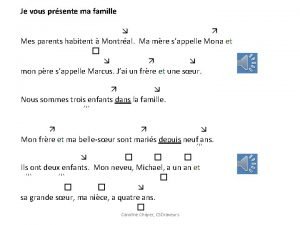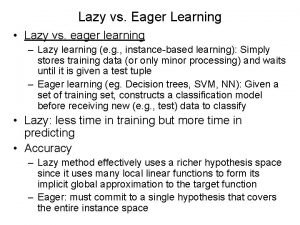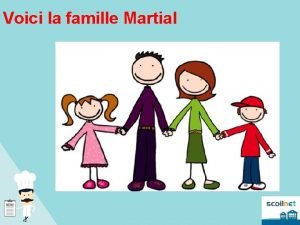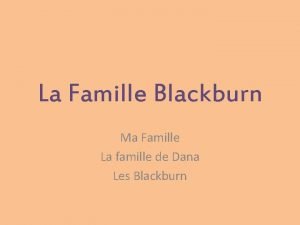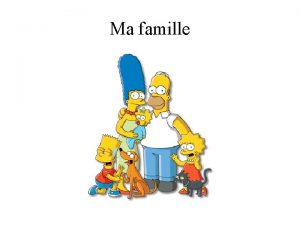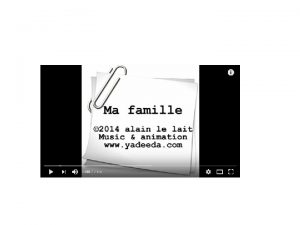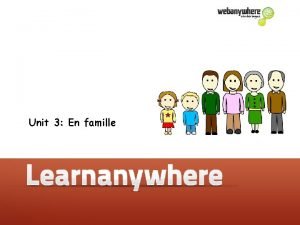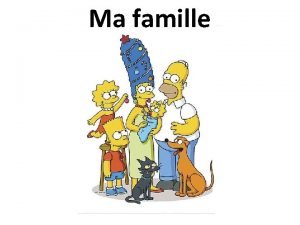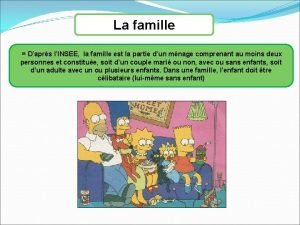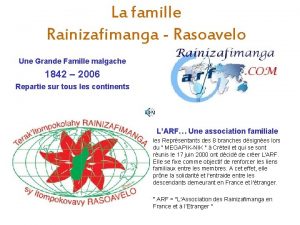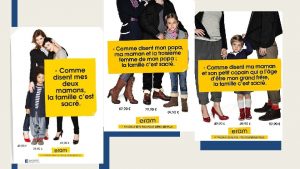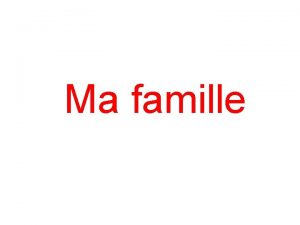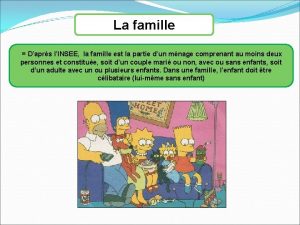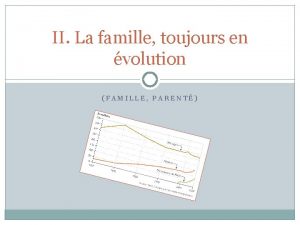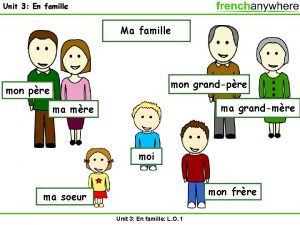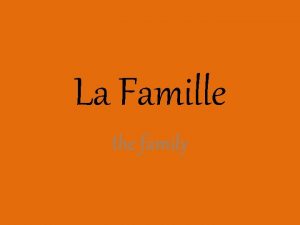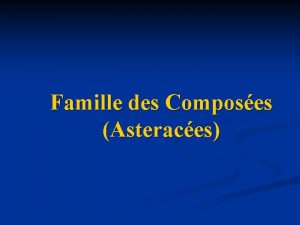Voici ma famille Today we are learning how







































































- Slides: 71


Voici ma famille • Today we are learning how to… – introduce your extended family – say ‘my’ in French and know how to use MON, MA, MES – understand a family tree

Voici ma famille mes grands-parents mon grandpère mes grands-parents ma grandmère mon grandpère mes parents mon oncle mon père mon frère mes tantes ma mère C’est moi ma grandmère ma sœur ma tante ma cousine


















J A Qui est qui? 1) Le père B 6) Le grand-père 2) La mère 3) Le grand frère 4) La tante 5) La petite sœur C D E I 7) La grand-mère 8) Le chien 9) Le chat 10)C’est moi! F H G

In French, there are 3 different words for MY - mon, ma and mes. You will know which one to use depending on the gender of the person or thing that you are talking about: e. g. Mon frère my brother Ma soeur my sister Mes parents my parents

Mon is used when the noun is masculine. Ma is used when the noun is feminine. Mes is used when the noun is plural. e. g. Mon livre Ma trousse Mes affaires my book my pencilcase my things

Now try these examples. Fill in the blanks with the correct word for MY (mon/ma/mes) mon père. 1. . . ma mère. 2. . . Now check mes cousins. 3. . . your answers. ma tante. 4. . . mon oncle. 5. . . mes grands-parents. 6. . . ma nièce. 7. . . mon mari. 8. . .

Did you get 8 out of 8? So far it’s easy peasy, isn’t it? The hardest part is knowing the gender of each noun, but remember, the plurals are easy to spot, just look for nouns ending in –s!

Just to clarify… The possessive adjective always agrees with the NOUN, not the person that it belongs to. In other words, a man would say mon livre, and a woman would also say mon livre because the book is masculine (le livre). Likewise, both men and women would say ma trousse, because pencilcase is feminine in French - it doesn't matter whether the owner of the pencilcase is male or female.













































 Voici le temps favorable
Voici le temps favorable Voici ma famille
Voici ma famille Antigentest åre
Antigentest åre Je me tiens à la porte et je frappe partition
Je me tiens à la porte et je frappe partition Voici que la saison victor hugo
Voici que la saison victor hugo Debout resplendis
Debout resplendis Bienvenue au culte d'adoration
Bienvenue au culte d'adoration Michel delpech - la fin du chemin
Michel delpech - la fin du chemin Prenez et mangez voici mon corps
Prenez et mangez voici mon corps Ton animal
Ton animal For todays meeting
For todays meeting Do we have class today
Do we have class today Meeting objective
Meeting objective Today lesson or today's lesson
Today lesson or today's lesson Today's lesson or today lesson
Today's lesson or today lesson Today's lesson or today lesson
Today's lesson or today lesson Cuadro comparativo e-learning b-learning m-learning
Cuadro comparativo e-learning b-learning m-learning Famille multigénique
Famille multigénique La famille de mozart
La famille de mozart Capteur
Capteur Famille chimique
Famille chimique Frida kahlo grand parents
Frida kahlo grand parents Mots de la famille imaginaire
Mots de la famille imaginaire Famille enchevêtrée
Famille enchevêtrée Sncf pass carmillon
Sncf pass carmillon Les grandsparents
Les grandsparents La famille romaine
La famille romaine C'est quoi la famille pour vous
C'est quoi la famille pour vous Issu d'une famille modeste
Issu d'une famille modeste Contrebasson
Contrebasson Valence des corps chimiques
Valence des corps chimiques Fille de jane berkin
Fille de jane berkin Jargonisms are
Jargonisms are Professional and social jargonisms
Professional and social jargonisms Famille monoparentale
Famille monoparentale Famille des halogènes
Famille des halogènes Famille des métaux alcalins
Famille des métaux alcalins Famille
Famille Famille tiberghien nord
Famille tiberghien nord Nicolas poussin la sainte famille
Nicolas poussin la sainte famille Anthropologie de la famille
Anthropologie de la famille La famille de siddhartha gautama
La famille de siddhartha gautama Famille gomez
Famille gomez Les fonctions de la famille
Les fonctions de la famille Comment s'appelle la mère dans la famille addams
Comment s'appelle la mère dans la famille addams La famille des cochons ramenée dans l'étable analyse
La famille des cochons ramenée dans l'étable analyse Fiche artiste frida kahlo
Fiche artiste frida kahlo La famille
La famille Dahlia famille
Dahlia famille The arnolfini marriage paul durcan
The arnolfini marriage paul durcan Bonjour ma famille
Bonjour ma famille La famille berthier
La famille berthier Famille
Famille Médecine de famille tunisie
Médecine de famille tunisie Miss kelly 1947
Miss kelly 1947 Je présente ma famille
Je présente ma famille Observe les membres de la famille de pierre
Observe les membres de la famille de pierre Walt what are we learning today
Walt what are we learning today The chapter you are learning today
The chapter you are learning today What are we learning today
What are we learning today Lda supervised or unsupervised
Lda supervised or unsupervised Concept learning task in machine learning
Concept learning task in machine learning Analytical learning in machine learning
Analytical learning in machine learning Non associative learning example
Non associative learning example Eager learner vs lazy learner
Eager learner vs lazy learner What is conceptual learning
What is conceptual learning Difference between inductive and analytical learning
Difference between inductive and analytical learning Apprenticeship learning via inverse reinforcement learning
Apprenticeship learning via inverse reinforcement learning Apprenticeship learning via inverse reinforcement learning
Apprenticeship learning via inverse reinforcement learning Deductive learning vs inductive learning
Deductive learning vs inductive learning Pac learning model in machine learning
Pac learning model in machine learning Pendekatan unsupervised learning adalah
Pendekatan unsupervised learning adalah

